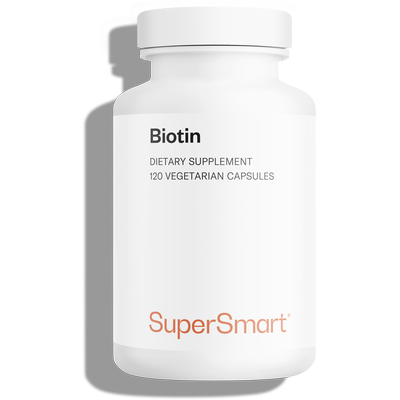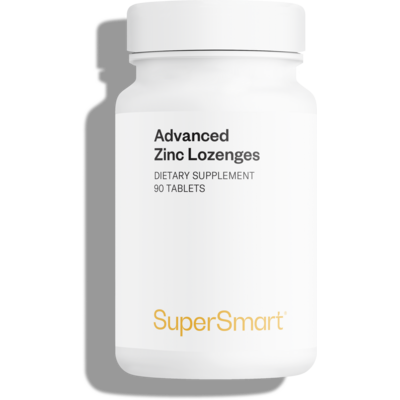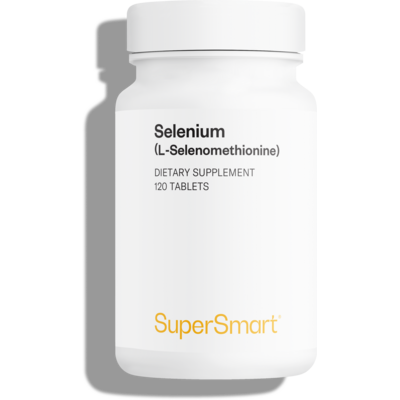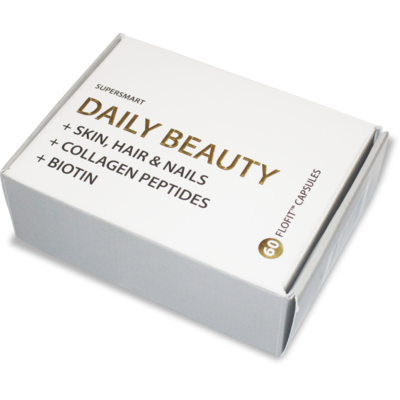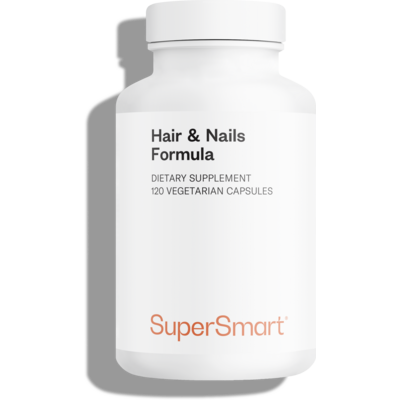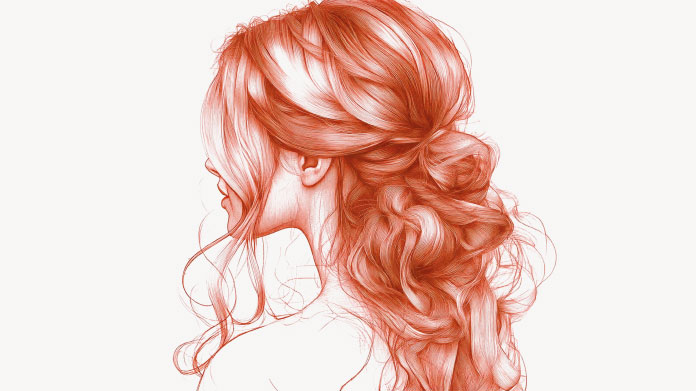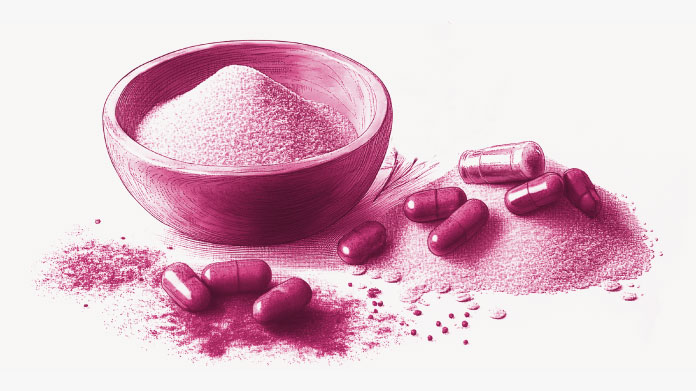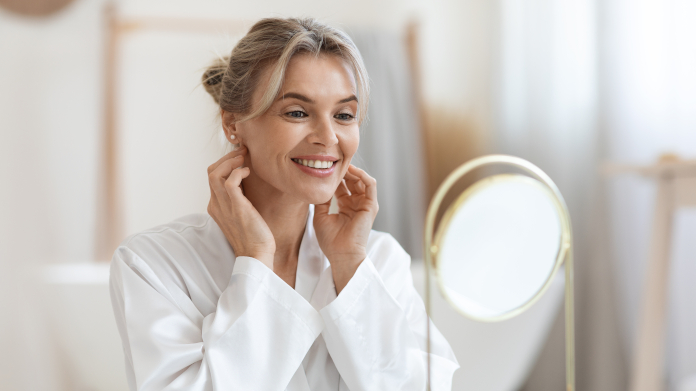Is selenium good for the hair?
It’s sometimes said that supplementing with selenium helps make the hair healthy, strong and shiny. Is that really true? How does it compare with other well-known hair supplements such as zinc and biotin?

What is selenium and what are its effects on the hair?
Selenium is a trace-element, tiny amounts of which are needed in order for the body to function properly.
It is involved in many essential functions, including maintaining the immune system, producing thyroid hormones and metabolising testosterone.
It also helps protect cells against oxidative stress by supporting the synthesis of glutathione-peroxidase, a well-known antioxidant enzyme that occurs naturally in the body.
Finally, selenium plays an effective role in maintaining healthy hair by promoting growth, preventing loss (as a result of its antioxidant properties which protect hair follicles from oxidative stress) and improving the quality of the scalp. But should you really be adding a selenium supplement to your ‘haircare routine’?
Do you really need to take a selenium supplement to support the health of your hair?
While selenium plays a key role in the health and appearance of the hair, supplementation is really only beneficial if you are deficient in this trace-element.
Several studies (1-2) have shown that inadequate selenium intake (below 55μg a day), leads to impaired hair growth and pigmentation, causing problems such as hair discolouration and loss (alopecia). These same studies have also shown that supplementation at sufficient levels can help to restore healthy hair within 6 months.
However, for people with an adequate selenium intake (which is the case for most Western populations), supplementation will not make the hair healthier, shinier or more beautiful. Indeed, excessive intake could worsen its condition (3-4) and even lead to accelerated hair loss.
Is there a risk of selenium deficiency?
Incidence and symptoms of selenium deficiency
Though relatively rare in developed countries, selenium deficiency is still thought to affect between half a million and a billion people worldwide.
Typical symptoms include marked fatigue, decreased muscle strength, mood swings, irritability, frequent vomiting, increased susceptibility to infection, thyroid dysfunction and… hair problems. In the most severe cases, it can even lead to heart and joint damage.
On the other hand, excessive, prolonged intake is associated with a risk of selenium poisoning, resulting in brittle hair and nails, increased skin sensitivity and intense fatigue. The tolerable upper intake level for adults has been set at 400µg a day.
People at risk of selenium deficiency
Individuals most affected by selenium deficiency are those living in regions with naturally low levels in the soil, such as New Zealand and China (5), as well as people who have undergone chemotherapy or who suffer from serious intestinal diseases such as Crohn’s or ulcerative colitis.
Selenium-rich foods and sources
Ensuring an adequate selenium intake is easy insofar as it’s found in many common foods (tuna, mackerel, sardines, seafood, eggs, meat, offal, mushrooms, nuts…) A portion of fish or nuts (peanuts, Brazil nuts, almonds …) is enough to meet the recommended daily intake.
Those who are deficient may want to take a selenium supplement under the supervision of a health professional. Opt for selenium, the form with the best bioavailability.
For those still looking to make their hair stronger and shinier, there are fortunately other supplements which are effective and reliable.
Other supplements for healthy hair
Zinc, excellent for the hair
Zinc is another trace-element which helps maintain healthy hair by supporting growth and maintaining the hair follicle.
A number of studies have shown those affected by hair loss to have inadequate zinc levels.
In terms of supplementation, choose zinc bisglycinate with high bioavailability (try, for example, Advanced Zinc Bisglycinate Lozenges).
Biotin, aka the ‘beauty vitamin’
Also known as the ‘beauty vitamin’, biotin helps to maintain healthy hair by contributing to keratin synthesis, a key component of hair, representing 95% of its composition.
As the body can neither produce nor store biotin effectively, we have to obtain a regular supply from the diet or rely on appropriately-dosed supplements (such as Biotin).
Keratin supplements, the major component of hair
When a new hair forms in the absence of sufficient keratin, the result is dull, brittle hair (6-7).
It therefore features as a star ingredient in many supplements targeted at hair health and beauty.
Keratin is particularly beneficial when it’s in a form optimally-absorbed by the body: solubilised keratin (such as that used in Daily Beauty).
Synergistic formulations for the health and appearance of the hair
There are some synergistic formulations targeted at the health and appearance of the hair in which these three compounds are combined, along with a number of other beneficial micronutrients such as MSM and choline, at carefully considered doses (one such example is Hair & Nails Formula).
SuperSmart ADVICE
References
- Vinton NE, Dahlstrom KA, Strobel CT, Ament ME. Macrocytosis and pseudoalbinism: manifestations of selenium deficiency. J Pediatr. 1987;111(5):711–717.
- Masumoto K, Nagata K, Higashi M, et al. Clinical features of selenium deficiency in infants receiving long-term nutritional support. Nutrition. 2007;23(11–12):782–787
- Tortelly Costa VD, Melo DF, Matsunaga AM. The Relevance of Selenium to Alopecias. Int J Trichology. 2018 Mar-Apr;10(2):92-93. doi: 10.4103/ijt.ijt_37_17. PMID: 29769785; PMCID: PMC5939011.
- Almohanna HM, Ahmed AA, Tsatalis JP, Tosti A. The Role of Vitamins and Minerals in Hair Loss: A Review. Dermatol Ther (Heidelb). 2019 Mar;9(1):51-70. doi: 10.1007/s13555-018-0278-6. Epub 2018 Dec 13. PMID: 30547302; PMCID: PMC6380979.
- Goldberg LJ, Lenzy Y. Nutrition and hair. Clin Dermatol. 2010;28(4):412–419.
- An SY, Kim HS, Kim SY, Van SY, Kim HJ, Lee JH, Han SW, Kwon IK, Lee CK, Do SH, Hwang YS. Keratin-mediated hair growth and its underlying biological mechanism. Commun Biol. 2022 Nov 19;5(1):1270. doi: 10.1038/s42003-022-04232-9.
- Tinoco A, Gonçalves J, Silva C, Loureiro A, Gomes AC, Cavaco-Paulo A, Ribeiro A. Keratin-based particles for protection and restoration of hair properties. Int J Cosmet Sci. 2018 Aug;40(4):408-419. doi: 10.1111/ics.12483. Epub 2018 Aug 28. PMID: 30047992.
5 Days
Easy to navigate site
Easy to navigate site, had what I was searching for, good price. easy order-check out
James Tucker
11 Days
My skin is clearing up nicely!
Pretty good for my skin so far.
Christian
13 Days
The new packaging is excellent
The new packaging is excellent - finally! No more squashed boxes and torn envelopes.
GORAN
14 Days
Great Product
Great Product
Larry Garrett
19 Days
Quick shipping
Quick shipping; good price. No issues!
Mary McCarty
20 Days
Thr product is very good and is helping…
Thr product is very good and is helping me on my health. Then is always on time
LUGO Luz
22 Days
Buying was fine
Buying was fine. I had problems with the website not recognizing my login info, and had to call to get it fixed. Other than that, everything was good.
David S. Clark
23 Days
Your super maca and super ginseng are…phenomenal
Your super maca and super ginseng are phenomenal supplements that compliment each other when taking them together. Fantastic feeling of well-being and lots of mid day energy without the crash.
Keith Mason
25 Days
I have had amazing results with every…
I have had amazing results with every supplement I've purchased. I am extremely satisfied with this company
kirstin Torres
26 Days
Fine products
Fine products . They are on the leading edge of online supplements. The only issue -so far-is they sometime run out of subscription items.
Jason Argos
28 Days
The ordering process is very user…
The ordering process is very user friendly and the products always come in a timely manner.
CARTER Rhonda
29 Days
The price for Dr
The price for Dr. Pero's AC-11 is reasonable and in line with his views. (my former colleague). Keep it pure.
CAMPBELL Clayton
32 Days
Right on every time.
Right on every time.
Arthur Nicholas
35 Days
They are cheaper than everyone else and…
They are cheaper than everyone else and the shipping was fast. Great company.
Patricia Adams
42 Days
Availability of quality health…
Availability of quality health supplements and it's wide variety is impressive. Ordering is seamless and shipping even during the holidays is well streamlined.
Mohamad Hussein


